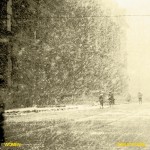|
|
 |
Dusted Reviews
Artist: Women Album: Public Strain Label: Jagjaguwar Review date: Oct. 8, 2010 |

|
|
|
 |
All the heroic-caliber reunions of the bands of my formative years have me scurrying back to Luc Sante’s Low Life for the best definition I’ve found of nostalgia, “generally defined as a state of inarticulate contempt for the present and fear of the future, in concert with a yearning for order, constancy, safety.” Oddly, this phrasing captures both the mood, sound and maybe the appeal of Women’s Public Strain .
Try listening to the clash of willfully off-kilter guitar against guitar on “Heat Distraction” and “Eyesore,” or to the swarming guitar noise and reverb and repetitive lyrics on the album opener “Can’t You See” and then think back on (if you’re old enough) A Minor Forest or June Of 44. (Maybe Google those bands and listen to the 30-second clips the search yields and compare the chiming tones and discordant major-key arpeggios.) It’s surprising how similar Women sounds to this partially forgotten, certainly no longer cool, and definitively indie-rock moment of indie rock, albeit sped up and thinned out to a more Chairs Missing tempo. For a time when effortless pop albums seem to capture kids’ hearts instantly, this is a painstaking, mindful record that, perhaps unwittingly, looks back toward a time of similarly thought-out, earnest albums. It tries too hard.
The best moments on Public Strain succeed by genuine bleakness. The instrumental “Bells,” oddly the most current-sounding song on the album, bears some similarities to the Oneohtrix Point Never/Emeralds scene, a wash of warm, shuddering chords. “Drag Open” functions perfectly as a Sonic Youth-esque exercise in shifting moods, moving from nervous to unhinged and back, as the guitars backing the monotone vocals go from a complex, discordant riff to a wild tremolo to another, more laid-back phrase. The result can’t help but leave a listener feeling rueful. On any gray day, these swelling dynamics against just-straining vocals will probably leave almost anyone who’s ever owned a pair of black plastic glasses analyzing the patterns in his tin-ceiling tiles.
Women’s last record had poppier, brighter aspects than Public Strain, and it’s hard to imagine what they might add to this sound beyond an amp’d up production that would wreck their very deliberate effect. It’s at once totally of, and totally opposed to, its own moment.
By Talya Cooper
|







